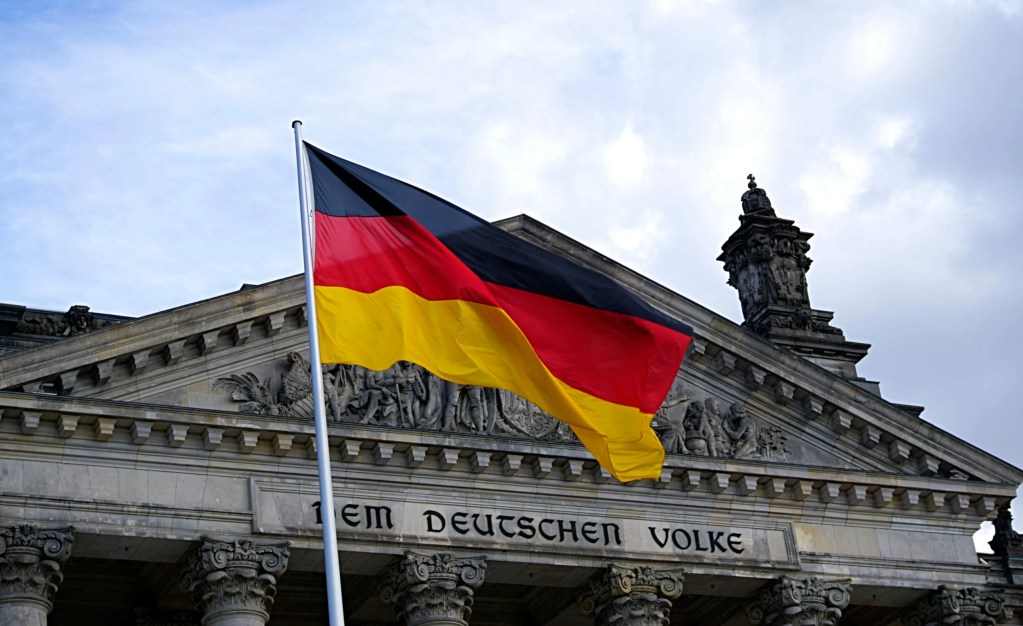
This article is apart of our weekly series associated with the The Global Subsidiary Index. The series is designed to help businesses identify the best countries for establishing a subsidiary based on key operational factors. GEOS provides a data-driven ranking of jurisdictions worldwide, assessing across 40+ criteria to bring you insights into global expansion opportunities.
Each country on the index is scored on an overall score out of 100, with each individual criterion out of 5 or 10. Higher scores indicate a more favorable environment for businesses. By leveraging these insights, companies can make informed decisions on where to establish a legal presence.
Start a company in Germany and be part of its growing digital economy. Once known mainly for engineering and manufacturing, Germany is now attracting record startup funding in sectors like AI, fintech, and cleantech. In 2025 alone, startups raised billions, with rising names like Enpal and Aleph Alpha leading the charge.
Berlin has become the country’s startup capital, pulling in global talent with its affordable lifestyle and investor networks. Munich and Hamburg aren’t far behind, building strength in mobility, cybersecurity, and fintech. With strong government support, startup visas, and reliable infrastructure, Germany offers both opportunity and stability.
If you’re planning to scale your business or enter Europe for the first time, this guide walks you through every step, from incorporation and compliance to hiring, banking, and tax essentials, so you can expand your business in Germany.
Why Should You Expand to Germany?
When you start a company in Germany, you gain access to Europe’s largest economy. With a GEOS Global Subsidiary Index Score of 65.6, Germany is one of Europe’s strongest places to grow a business.
The first platform dedicated to streamlining entity setup and management.
Europe’s Economic Powerhouse
Germany’s large market, strong industrial base, and advanced infrastructure attract foreign investors from around the world.
The rules can be complex, especially around tax and employment, but businesses that take the time to navigate them gain access to one of the world’s most stable and profitable markets.
A High-Income, High-Demand Market
Germany earns a 10/10 GDP Per Capita Score, with GDP per capita reaching USD 55,800 in 2024. That reflects real purchasing power. It’s a mature, high-value market where customers care about quality and innovation.
- Buyers expect reliability and performance.
- They can afford to pay for it.
This makes Germany ideal for premium products, advanced technology, and professional services.
Steady, Broad-Based Economic Growth
Businesses that start a company in Germany gain from a strong and steady economy. With a GDP Growth Score of 4/5, Germany shows consistent growth across manufacturing, services, and technology.
It’s not explosive growth, but it’s steady and dependable. Manufacturing still plays a major role, making up 19.7% of total output in 2024, compared to 10.6% in France and 17.5% in the U.S.
The sector generated EUR 2.9 trillion in turnover in 2024, with the automotive industry leading at EUR 476 billion. That mix of strength and stability keeps the economy moving even during global slowdowns.
A Balanced, Diverse Economy
Germany’s Industry Diversity Score of 5/5 highlights how broad its economy really is. Four sectors dominate: automotive, mechanical engineering, chemicals, and electrical industries.
- Major players include Volkswagen, BMW, Mercedes-Benz, BASF, and Siemens.
- Mechanical engineering employs about 1.3 million people, mostly in small and mid-sized firms.
- Overall, around 8 million people work in manufacturing — more than the population of Denmark.
Germany’s export ratio in manufacturing was 48.7% in 2022, with motor vehicles and parts making up 16.9% of total exports in 2024. That level of diversity and export power helps cushion the economy from global shocks.
Stable Politics and Strong Finance
Germany scores 4/5 on Political Risk, reflecting its stable democracy and transparent institutions. Frankfurt is home to both the Deutsche Bundesbank and the European Central Bank, giving the country a solid financial foundation. Businesses benefit from a reliable legal system and long-term policy consistency — something not every market can offer.
World-Class Infrastructure and Connectivity
Germany earns a 5/5 communications infrastructure score, backed by outstanding transport and digital systems. Highways, railways, and airports connect easily across Europe, while digital networks continue to expand.
The telecom sector employs over 155,000 people across 3,700 companies and invested EUR 13.6 billion in 2023 to expand 5G and private networks. National and EU initiatives, like the Digital Decade Strategy, aim for full gigabit and 5G coverage by 2030.
This makes Germany a top spot for industries like advanced manufacturing, logistics, and smart technologies.

Tax & Regulatory Environment
To start a company in Germany, you need to play by some of Europe’s most structured financial rules. The system can feel complex at first, but it’s also transparent and predictable.
Businesses are required to pay VAT to the tax authorities as part of their tax obligations in Germany. The tax office (Finanzamt) is responsible for tax registration and collection, and businesses must register with the tax office to obtain a tax number.
Selecting the appropriate legal structure is crucial for meeting tax and regulatory requirements in Germany. Businesses must calculate and report their income tax to the tax office, and working with a tax advisor or accounting software can help manage income tax obligations.
Companies that stay organized and plan ahead can operate with confidence in one of the world’s most stable regulatory landscapes. It is crucial for businesses to pay taxes on time, as failure to do so can result in penalties or account freezes by the tax office.
Corporate Tax Rate
Germany’s corporate taxes are moderate by European standards, earning a 6/10 score. The average effective rate is about 30%, combining federal, trade, and solidarity surcharges. The corporation tax is 15%, with a 5.5% solidarity surcharge, bringing the total to 15.825%. The trade tax (Gewerbesteuer) varies by location.
- Municipalities set their own multipliers, usually between 8.75% and 20.3%.
- The total rate typically ranges from 30% in Berlin to 33% in Munich.
That difference may seem small, but smart location planning can cut the total tax burden by up to 5%. In Germany, where you set up shop matters.
Tax & Accounting
Germany’s accounting and tax framework is detailed and precise, reflected in its 4/10 score. Companies follow German GAAP (HGB), while listed firms must use IFRS.
Every business must maintain double-entry bookkeeping and prepare annual financial statements. In addition, businesses must comply with VAT reporting requirements, which are a key aspect of tax compliance in Germany.
The commercial register is a public record containing information about registered businesses’ legal and commercial operations, particularly for legal entities like corporations and limited liability companies.
Medium and large firms include a balance sheet, profit and loss account, notes, and a management report. Smaller firms can file simplified versions but must still submit them electronically to the Bundesanzeiger (Federal Gazette).
Large companies are also audited annually, and all businesses must retain financial records for 10 years. The process can be time-consuming but promotes transparency and credibility.
Compliance Reporting
Germany scores 3/5 for compliance reporting. Companies must file quarterly and annual reports, with timelines based on their size. Large and medium businesses have three months after the fiscal year to report, while smaller ones have up to six months. Late filings can lead to automatic fines, so staying ahead of deadlines is key.
Germany also follows the OECD’s Pillar Two rules, applying a global minimum tax for multinational groups earning over EUR 750 million. This aligns the country with broader international tax standards and helps ensure fairness across markets.
Openness to Foreign Ownership
Germany earns an 8/10 score for openness to foreign ownership. The country allows 100% foreign ownership in most industries, with only a few exceptions in sensitive sectors like defense or critical infrastructure.
Foreign companies holding German real estate must report their Ultimate Beneficial Owners (UBOs) to the Transparency Register. This rule also covers indirect or long-held investments. Non-compliance can bring fines of up to EUR 1 million, and penalties are made public.

Data Management Laws
Germany’s data protection regime scores 4/5 and is known for being strict but consistent. The country follows the EU’s GDPR, supported by the Federal Data Protection Act (BDSG), which adds extra rules for sectors like finance and law enforcement.
- The Telecommunications-Digital-Services Data Protection Act (TDDDG) sets privacy rules for telecoms and online platforms.
- It governs cookie consent, user data collection, and digital tracking.
Regulators take enforcement seriously, and fines can be significant. Companies handling customer data should have strong compliance systems in place from day one.
Local Expert Insight
When you start a company in Germany, understanding the tax system is key. The country’s tax landscape is complex but rewards attention to detail. The trade tax alone can change your effective rate depending on location. Working with local tax experts helps cut costs and prevent unnecessary risks.
Incorporation & Compliance Essentials
Starting a company in Germany takes structure and patience. When starting a new company, it is essential to carefully select the appropriate business structure and understand the different legal structures available.
Registering as a sole proprietor is a quick and straightforward process in Germany, often completed within a few weeks and without notarization.
Legal requirements and obligations vary depending on your choice. The liberal profession is a specialized legal structure in Germany that allows certain professionals, such as consultants, architects, and healthcare providers, to register their businesses quickly and with fewer formalities. The process is detailed, but it follows clear rules that make each step predictable.
You’ll deal with notaries, paperwork, and local authorities, but once registered, your business operates in one of the most stable and trusted environments in Europe. After registering your business, the trade office automatically notifies other relevant authorities, streamlining compliance and ensuring all necessary agencies are informed.
For example, liberal professions and small businesses may not be subject to trade registration. Liberal professionals, such as doctors, engineers, and architects, have distinct legal registration requirements and may benefit from tax exemptions compared to other business types. Here’s what to expect when setting up and maintaining compliance in Germany.
Company Registration Timeline
Setting up a company in Germany takes about 2 to 3 months. The process includes notary appointments, document apostilles, certified translations, and registration with the Handelsregister. Every GmbH must be established through a German public notary, who verifies company statutes and shareholder contributions.
Only certain types of business entities, such as corporations and tradespeople, are required to register in the commercial register, while liberal professions and small businesses may not be.
Small mistakes can cause delays. Missing signatures or incomplete translations often hold up registration. It helps to confirm all document requirements with the notary in advance and prepare everything before your appointment.
Resident Director
Germany scores 3/5 for its resident director requirement. There’s no nationality restriction, but it’s best to have at least one managing director (Geschäftsführer) based in Germany. This ensures the company’s tax residency, since Germany defines residency by the place of effective management—where daily business decisions are made.
- Directors should make and record key decisions in Germany.
- A local director simplifies communication with banks and tax offices.
Without one, the company may risk being viewed as managed abroad, which can complicate its tax position.
Original Paperwork
Germany still relies heavily on traditional documentation, earning a 2/5 score. Incorporation requires notarized originals and certified German translations of all key documents. Apostilles are also needed for foreign paperwork.
Founders usually sign incorporation papers during an in-person notary meeting. Remote signing is possible in limited cases through a power of attorney, but rules vary by region.
Registered Address
Germany scores 4/5 for address requirements. Every company must have a registered business address in Germany for official correspondence. A physical, accessible business address is mandatory for company registration.
This can be a physical office or coworking space; virtual offices or virtual registered addresses managed by a service provider are only accepted under specific circumstances.
- The business address must be in the same area as the company’s Handelsregister.
- Authorities verify the business address before approving the registration.
Having a valid business address also helps with opening a bank account and receiving tax notices.

Government Portal Sophistication
Germany earns a 4/5 score for its improving digital systems. The Bundesportal and Unternehmensregister let users search and file documents online. According to the Digital Government Factsheet Germany 2019, these tools are expanding access to company registration, tax filing, and public procurement services.
Digital progress is steady, but not all states are fully integrated yet. Some steps, like notarization, still require in-person action. Ongoing updates under the Online Access Act (OZG) aim to make these processes fully online.
In-Person Travel Requirements
Germany scores 2/5 for convenience. Founders must usually attend a notary appointment in person to sign incorporation documents. Opening a bank account or confirming capital deposits may also require physical presence.
Remote options are limited, though slowly increasing. The in-person requirement helps verify identities and maintain document accuracy.
Local Expert Insight
Incorporation in Germany is detailed but manageable. A local notary ensures compliance, and working with a German-based advisor helps you navigate regional tax differences and filing standards. Local insight can save time and prevent costly delays.
GmbH vs. UG: Choosing the Right Entity Type
When expanding to Germany, choosing between a GmbH (Gesellschaft mit beschränkter Haftung) and a UG (Unternehmergesellschaft) is one of the first big steps. Both offer limited liability, but they fit different business goals and budgets.
The UG, or Mini-GmbH, is a leaner version designed for startups and small businesses. Many entrepreneurs can start a UG with just a few hundred euros, making it an affordable option for small-scale startups.
Gesellschaft mit beschränkter Haftung (GmbH)
A GmbH is the go-to choice for established businesses planning to operate long-term in Germany. It’s reliable, respected, and widely recognized.
- Minimum share capital: €25,000, with at least €12,500 paid in upfront
- Liability: Limited to company assets, protecting personal wealth
- Best for: Medium to large companies with steady operations
- Reputation: Trusted by banks, clients, and suppliers
A GmbH can also accept non-cash contributions like property, patents, or equipment. It requires annual financial statements and notarial filings for major changes. The setup process costs more and takes longer, but the credibility gained often pays off.
Unternehmergesellschaft (UG or “Mini-GmbH”)
The UG, or Mini-GmbH, is a leaner version designed for startups and small businesses. It offers the same limited liability protection but with far lower entry costs.
- Minimum share capital: As little as €1
- Liability: Limited to company assets
- Best for: New businesses testing the market
- Profit rule: Must retain 25% of profits until €25,000 capital is reached
- Reputation: Considered less established than a GmbH
The UG can only be formed with cash deposits, not assets. It’s quick to set up but can seem less credible to lenders and partners. Once the company grows and meets the capital threshold, it can easily convert into a GmbH.
Choosing the Right Legal Structure
Before starting a company in Germany, you need to decide on the right legal structure for your business. Each option affects taxes, setup time, and liability.
- Sole proprietorships are the simplest structure. They’re quick to register and ideal for freelancers or single founders. However, the owner is personally liable for all business debts.
- Civil law partnerships (GbR) suit two or more founders working together. They require minimal paperwork but don’t limit personal liability.
- A limited liability company (GmbH) offers stronger protection. Liability stays within company assets, shielding personal property. You’ll need at least €25,000 in minimum share capital, with half paid before registration.
- Liberal professions, like doctors, architects, and lawyers, follow different rules. They can register directly with professional chambers and often skip trade registration.
Choosing the right form depends on your business model, risk tolerance, and funding goals. A tax advisor can help you pick the most efficient setup and avoid early compliance mistakes.
Local Expert Insight
Many foreign investors start with a UG to enter the market faster and save on startup costs. Later, they upgrade to a GmbH through notarial re-registration and capital restructuring once business picks up. It’s a practical way to grow at your own pace.

Workforce & Employment Considerations
If you start a company in Germany, you’ll need to understand how its structured labor system works. Its labor market is predictable, and very employee-focused. The rules can feel strict at first, but they create stability and trust on both sides. For employers, it means clear expectations. For workers, it means strong protection and security.
Self employed people, such as freelancers and tradespeople, are subject to different legal and employment regulations compared to traditional employees. For certain regulated professions, proof of work experience or certificates of competence from your home country may be necessary for licensing or exemption procedures in Germany.
Employee-Centric Framework
Germany’s labor laws are detailed, earning a complexity score of 6/10. They cover everything from working hours and leave to job security and equal treatment. The goal is to keep things fair between employers and employees.
When businesses start a company in Germany, they often find that employment protection is strong. A 1/5 score for employer flexibility shows just how much the law favors workers. Terminations need solid justification, and employees can challenge dismissals in court within three weeks. The system also makes it easier for people to work part-time, take family leave, or care for relatives without losing their jobs.
Payroll and Benefits
Employers contribute about 20% of each employee’s gross salary toward social insurance, giving Germany a 3/5 score for payroll contributions. These payments fund a strong safety net that includes:
- Health insurance: 14.6%, shared equally
- Pension insurance: 18.6%, split evenly
- Unemployment insurance: 2.6%, shared between both sides
- Long-term care insurance: 3.6%, divided almost equally
When managing health insurance and other benefits, employers should consult with their insurance company to ensure proper coverage and compliance with German regulations. New businesses, such as freelancers or GmbHs, should also account for expenses related to insurance providers when planning their initial budget and legal requirements.
This system earns 3/5 scores for both benefits and pension management. It’s a big cost upfront, but it ensures employees are protected through every stage of life.
Collective Bargaining and Unions
When you start a company in Germany, it’s important to understand how collective bargaining shapes the workplace. Unions hold a steady role in Germany, earning a 3/5 influence score.
Industry-level agreements (Tarifverträge) set pay and working conditions across entire sectors. Unions like IG Metall and ver.di remain major players, keeping workplaces consistent and fair.
Companies with more than five employees must also form a works council (Betriebsrat). Employers need to consult the council on major workplace changes, from restructures to layoffs.
Local Expert Insight
Having a works council means HR decisions take more coordination. You’ll need to plan discussions ahead and document changes carefully. It may feel like extra work, but it helps maintain transparency and long-term employee trust.
Talent Availability & Salaries
Germany has one of the deepest talent pools in Europe. The workforce is skilled, reliable, and used to working in global environments. Finding talent isn’t hard, but hiring top professionals can be expensive.
Deep and Diverse Talent Base
Germany scores 5/5 for developer talent. Cities like Berlin, Munich, and Hamburg attract experienced engineers, data scientists, and developers from around the world. The mix of startups and major tech firms keeps competition high and salaries rising.
Marketing, sales, and finance roles also score 5/5. The country’s professionals are well-trained, confident in English, and familiar with international business standards. This makes it easier for global companies to build local teams without major language barriers.
Hiring and Recruitment
Recruitment is efficient, earning an 8/10 score for ease of hiring. Germany’s job platforms are strong, and hiring processes are well-structured. Employers can usually find qualified candidates quickly.
That said, demand for tech and engineering roles often outpaces supply. Companies looking for niche expertise may face delays or higher salary expectations.
Salaries and Cost Considerations
Wages in Germany are on the higher side, reflected in a salary benchmarking score of 2/10. Big cities like Munich, Frankfurt, and Berlin lead the list for pay and cost of living.
- Tech salaries are among the highest in Europe.
- Marketing and finance professionals also earn well above average.
- Southern Germany can pay 20–30% more than the east.
These differences come down to local industry strength and living costs. When you start a company in Germany, factor these variations into your hiring strategy and budget planning. Competitive salaries and location choices can make a big difference in attracting top talent.
Language Skills
Germany earns a 3/5 language score. English is widely used in business, especially in larger cities and international companies. Still, legal documents and filings must be done in German. Some smaller firms also prefer day-to-day communication in the local language.
Local Expert Insight
Employers who understand local pay trends have an advantage. Many attract top candidates by offering hybrid work options, relocation help, or clear career development paths. The market rewards flexibility and strong company culture just as much as salary.
Financial & Banking Considerations
Germany’s banking system is strong and dependable, but setting up can take time. Opening a business bank account is crucial for facilitating business transactions and separating personal and business finances, which simplifies tax management and enhances your business’s credibility.
Operating costs are moderate to high, giving the country an average budget score of 6/10. When you start a company in Germany, remember that budgeting for office space is an essential part of managing business expenses, especially for freelancers and startups.
Banking and KYC Requirements
Banks take compliance seriously, earning a KYC score of 3/5. The Money Laundering Act (Geldwäschegesetz) requires strict “Know Your Customer” checks.
Expect to provide:
- Identification for directors and shareholders
- Proof of address and tax numbers
- Registration documents and evidence of real business activity
Directors often need to attend in person to open accounts. Traditional banks move cautiously, while digital banks like N26 or Finom may speed things up but still require verification.
To stay compliant, companies should keep records for five years, maintain due diligence policies, and train staff to handle suspicious activity.
Prepare all required documentation in advance and familiarize yourself with KYC requirements to streamline the process of opening a business account in Germany.
Expense Management
Germany earns a 3/5 for expense management. Accounting follows the Handelsgesetzbuch (HGB), which requires accurate records and reconciled invoices. Working with a local accountant or software helps stay compliant and avoid delays.
Local Expert Insight
Opening a business account can take weeks. Banks want to see real business activity before activation, such as contracts or invoices.
Immigration & Work Permits
Germany attracts skilled professionals from around the world, so immigration rules play a key role for expanding businesses. It is the OECD’s second-largest destination for immigrantspdf), with over 14 million foreign-born residents.
For non-EU/EEA citizens planning to live and work in Germany, obtaining the correct residence permits is essential to ensure legal compliance and eligibility for business activities.
The system is structured, supported by integration programs, and generally clear to follow. Still, it can take time for non-EU nationals to get approved, giving Germany an Immigration Complexity Score of 3/5.
Local Insight
Non-EU employees must register a local address before they can apply for a residence permit. After registering a local address, individuals must obtain a tax id, which is necessary for business registration with the Finanzamt and for accessing government services. This extra step can slow onboarding if not planned early.
Hiring Non-EU Talent
EU citizens can live and work freely. Non-EU workers who start a company in Germany or plan to join one need a German work visa or EU Blue Card, which can take a few months to process. Most permits start as a D visa valid for up to a year and later convert into a residence title that can last several years.
Applicants usually need:
- A confirmed job offer from a German employer
- Recognized qualifications such as a degree or trade certification
- Sufficient income (around €58,400 per year for Blue Card holders)
- Basic German language skills, depending on the role
Main Visa Options
- Skilled Worker Visa: For roles requiring formal training or qualifications.
- EU Blue Card: For highly skilled professionals earning at least €48,300 per year, or less in shortage fields like STEM and healthcare.
- Experienced Worker Visa: For candidates with two or more years of relevant experience and recognized credentials.
- Self-Employment Visa: For founders or freelancers who can show economic benefit and financial stability.
Integration and Work Culture
Germany has a strong framework for integration. Employment rates for immigrants sit around 70%, among the highest in the EU. Language programs and cultural support are widely available, helping newcomers settle in faster.
Registration and Local Requirements
After deciding on your structure, register with your local trade office (Gewerbeamt). You’ll need to submit required documents, including your ID, business address, and description of planned business activities.
The trade office automatically notifies other authorities, such as the tax office and local chamber of commerce, to streamline the process. Expect to pay a small registration fee, usually a few hundred euros.
If your business needs specific licenses — for example, a construction company — you must apply for those before trading. Once approved, you’ll receive a tax number from the tax office for tax registration and reporting.
Banking and Finance Essentials
Opening a business bank account is mandatory for transparent business transactions. It separates personal and company funds, simplifies bookkeeping, and builds trust with clients and partners.
Most founders open accounts with major insurance providers and banks that offer business services in a central location. When opening a bank account, bring your company documents, proof of address, and identification for managing directors.
Keep in mind:
- Some banks require an in-person meeting to verify your identity.
- You may need to show your share capital deposit for GmbH formation.
- A verified business account is needed for tax registration and loan eligibility.
If you plan to apply for public loans or a start-up grant, your business plan and financial records must be in order.
Business Planning and Market Entry
Every new business in Germany starts with a strong business idea and thorough market research. A clear business plan helps prove viability to banks, investors, and immigration authorities if you’re applying for a residence permit based on self-employment.
Your plan should include:
- Goals and target market
- Estimated startup costs and business structure
- Forecasted income and business taxes
- Office setup and insurance company requirements
For medium-sized enterprises entering Germany, understanding commercial operations and compliance under the commercial register ensures credibility and smooth scaling.
Unique Germany Expansion Insights
Expanding into Germany takes planning and precision. The system works well, but it demands accuracy and patience. Businesses that stay organized and understand local expectations tend to move through the process more smoothly.
New businesses are typically required to register with the local chamber of industry and commerce (IHK), which provides support services, training, and licensing examinations within the region. Registration with the local chamber is mandatory for many business types, and a membership fee is charged upon registration.
When it comes to compliance and permits, certain businesses, such as a construction company, must obtain specific building permits and comply with additional regulations to operate legally in Germany.
Share Capital Requirements
A GmbH needs €25,000 in share capital, with at least half paid before registration. It’s a sign of stability that helps build credibility with banks and partners.
- Smaller companies often start with a UG (mini-GmbH).
- It only requires €1 in capital, but 25% of profits must stay in the business until the full €25,000 is reached.
Notary-Dependent Incorporation
Every incorporation goes through a public notary. The notary certifies the documents and files them with the Handelsregister.
- Missing apostilles or translation mistakes are common causes of delay.
- Keeping documentation complete and accurate helps avoid rejections.
Decentralized System
Germany runs on a federal system. Each Bundesland manages its own tax and commercial offices.
- Procedures and approval times can vary slightly by region.
- Local expertise helps you stay compliant and avoid unnecessary steps.
Business Culture and Communication
German business culture values clarity and reliability. Meetings are structured, communication is straightforward, and follow-up is expected.
- Written records are standard practice.
- Punctuality and preparation go a long way in building trust.
Germany rewards structure and attention to detail. Companies that plan carefully, respect formalities, and stay transparent can establish strong, lasting operations in Europe’s most dependable market.
How GEOS Simplifies Your Expansion into Germany
In Germany, they measure twice and cut once. Every step, from notary appointments to tax registration, follows strict procedures. GEOS manages these requirements so your expansion stays smooth and compliant.
The platform coordinates entity registration, bank introductions, and compliance filings within Germany’s structured legal system. It keeps documents organized, ensures filings meet local standards, and helps prevent costly delays.
Smart Expansion Support
GEOS uses AI to streamline what is often a slow, manual process. It tracks progress, flags missing information early, and keeps records secure.
- Keeps filings and deadlines on schedule
- Simplifies communication with local authorities
- Ensures all documentation stays accurate and accessible
In Germany, planning is everything. GEOS makes sure your plan is watertight before launch.
Is Germany the Right Fit for Your Business?
With a GEOS Global Subsidiary Index Score of 65.6, Germany remains one of the best destinations for expansion. Its strong economy, skilled workforce, and transparent regulations attract companies worldwide. Still, the process demands precision and patience.
GEOS helps you meet every requirement confidently so you can focus on growing your business instead of managing paperwork.
📩 Contact GEOS to plan your German expansion with precision and local expertise.
This article does not constitute legal advice.




